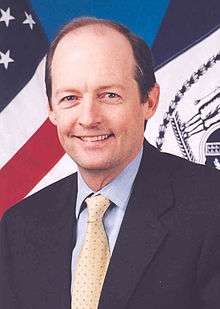Michael A. Sheehan
| Michael A. Sheehan | |
|---|---|
 | |
| Assistant Secretary of Defense for Special Operations/Low Intensity Conflict & Interdependent Capabilities | |
|
In office 2011–2013 | |
| Preceded by | Michael Vickers |
| Deputy Commissioner for Counter Terrorism NYPD | |
|
In office 2003–2006 | |
| Assistant Secretary General of Mission Support United Nations | |
|
In office 2001–2003 | |
| President | George W. Bush |
| U.S. Ambassador-at-Large for Counter Terrorism | |
|
In office 1998–2000 | |
| President | Bill Clinton |
| Personal details | |
| Born |
February 10, 1955 Red Bank, New Jersey |
| Profession |
Soldier Counter Terrorism Expert |
| Military service | |
| Allegiance | United States of America |
| Service/branch | United States Army |
| Rank | Colonel |
Michael A. Sheehan (born February 10, 1955) is a United States author and former government official and military officer. He is currently Distinguished Chair at the U.S. Military Academy in West Point, New York and a terrorist analyst for NBC News. He was born in Red Bank, New Jersey. [1]
Education
Sheehan graduated from Christian Brothers Academy in New Jersey in 1973 and the United States Military Academy (West Point) in 1977. Sheehan has a Master of Science in Foreign Service from the Georgetown University School of Foreign Service as well as one from the United States Army Command and General Staff College.
Military career
He served as an officer in the infantry and Special Forces. He had several overseas assignments, as a commander of a "counter-terrorism" unit in Panama, a counterinsurgency advisor in El Salvador, an infantry company commander in Korea, and on peacekeeping duty in Somalia and Haiti. Also while on active duty, he served in the White House on the National Security Council staff for Presidents George H. W. Bush and Bill Clinton.
Department of State
In 1998, he was appointed Coordinator for Counterterrorism with the rank and status of Ambassador-at-Large at the United States Department of State and was confirmed by the United States Senate for this position in 1999.[2] Following an assignment as Assistant-Secretary-General at the United Nations in the Department of Peacekeeping Operations (2001 to 2003),[3] Sheehan served as Deputy Commissioner of Counter Terrorism for the New York City Police Department until May 2006.[4]
According to General Daniel P. Bolger's book "Why We Lost", at an acrimonious meeting in the Clinton White House, Mr. Sheehan asked the members of the Armed Forces present: "Does Al Quaeda have to hit the Pentagon to get your attention?"
Life after diplomatic service
Sheehan then served as President and co-founder of Lexington Security Group, an international consulting firm that specializes in providing international law enforcement, internal security, and national defense organizations with strategic guidance, unit training, and individual mentoring to manage emerging security challenges.[5] He was a partner in Torch Hill Investment Partners, a private equity group in New York City that specializes in the defense, intelligence and security sectors.[6] He was also a terrorism analyst for NBC News and a fellow at New York University's Center on Law and Security.[7]
Return to federal service
The White House nominated Sheehan to become Assistant Secretary of Defense for Special Operations and Low Intensity Conflict on Nov. 1, 2011.[8] The U.S. Senate Senate Armed Services Committee held his confirmation hearing on Nov. 17, 2011,[9] and he was confirmed by a voice vote on Dec. 17, 2011.
Author
Sheehan is the author of the book Crush the Cell: How to Defeat Terrorism Without Terrorizing Ourselves ISBN 978-0-307-38217-7 [10][11] After the attempted bombing in Times Square, Mr. Sheehan concluded the terrorist was a 'lone wolf' and wrote so in the New York Times. However, experts in the field have concluded that he was part of a terrorist group based in Pakistan.[12]
References
- ↑ http://www.gpo.gov/fdsys/pkg/CHRG-112shrg74537/html/CHRG-112shrg74537.htm
- ↑ United States Department of State – History of the Department of State During the Clinton Presidency (1993-2001)
- ↑ United Nations – Press Release – Secretary-General Appoints Michael Sheehan as Assistant Secretary-General for Peacekeeping Operations
- ↑ City of New York, Press Release, May 20, 2003 – Mayor Michael R. Bloomberg and Police Commissioner Raymond W. Kelly Appoint Michael Sheehan As Deputy Commissioner For Counter Terrorism
- ↑ LSG at a glance
- ↑ Torch Hill Investment Partners – Investment Team
- ↑ Law and Security – Michael Sheehan
- ↑ http://www.whitehouse.gov/the-press-office/2011/11/01/presidential-nominations-and-withdrawl-sent-senate
- ↑ http://www.armed-services.senate.gov/Transcripts/2011/11%20November/11-75%20-%2011-17-11.pdf
- ↑ Sheehan, Michael A. (2008). Crush the Cell: How to Defeat Terrorism Without Terrorizing Ourselves. New York: Crown Publishers, an imprint of Random House. ISBN 978-0-307-38217-7.
- ↑ Random House – Listing for Crush the Cell: How to Defeat Terrorism Without Terrorizing Ourselves
- ↑ Op-Ed Contributor - The Hatfields and McCoys of Counterterrorism - NYTimes.com
External links
- New York Times, May 6, 2006 – "City to Lose Man Who Led Terror Fight", by William K. Rashbaum
- Probe of USS Cole Bombing Unravels Washington Post May 4, 2008